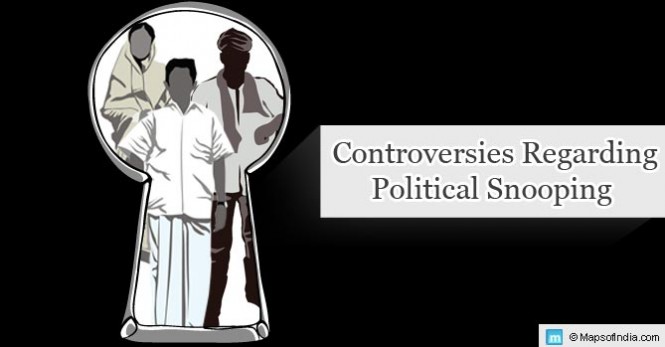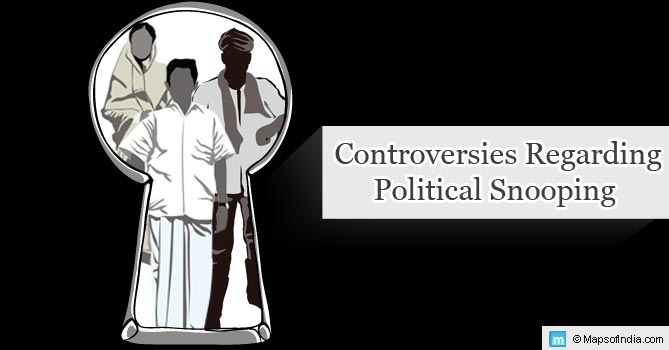 Snooping on political opponents is almost as old as politics itself. Very early, man realised that for staying ahead of an opponent, it was essential to get information on what the opponent was thinking and planning and towards that end he began to resort to all kinds of means to monitor and spy on his rivals.
Snooping on political opponents is almost as old as politics itself. Very early, man realised that for staying ahead of an opponent, it was essential to get information on what the opponent was thinking and planning and towards that end he began to resort to all kinds of means to monitor and spy on his rivals.
India too has had its share of controversies regarding political snooping and some date back a long time ago. More recently, it’s the AAP government that has faced intense political accusation of instigating political snooping.
The AAP Controversy
Recently, the Arvind Kejriwal-led AAP Government in Delhi ordered purchase of high technology equipment that has capability to intercept ongoing telephone calls through mobile and landlines. The purchase was ostensibly to strengthen the Anti-Corruption Bureau and equip them with high-tech tools that will enable them to fight corruption with staunch evidence. The problem is that the equipment also has the potential to be misused against political rivals or inner party dissenters.
With an internal document authorising purchase of this equipment being made public, the opposition led by BJP and Congress have been up in arms, along with a shrill media joining the issue against the move. The AAP government has tried to allay fears of misuse and it remains to be seen whether it will push ahead with the procurement. If not, how does the state government plan to proceed with fighting corruption in the absence of high tech tools?
Through the years, there have been several high-profile cases of political snooping with ‘Watergate’ being the most prominent amongst them.
Also Read: Aam Aadmi Party: The Sting and The Split
The Watergate Scandal
In the US, snooping against political rivals is a criminal act. It happened way back on 17 June 1972, when President Nixon, a Republican, ordered a break-in and tapping of the phone lines in the Democratic National Party Headquarters complex in Washington D.C. With the arrest of five persons who broke into the building, the scandal came to light and ultimately led to 48 persons being found guilty and sent to jail. On 9 August 1974, President Nixon was forced to resign. And the term ‘Watergate’ became synonymous with unauthorised snooping.
The Bose Family Surveillance Controversy
Recent declassifying of some documents pertaining to Subhash Chandra Bose and his family have revealed that his family members, including his brother, were under surveillance by the Intelligence Bureau. The news has once again led to controversy regarding Subhash Chandra Bose’s death and on who ordered the family to be kept under surveillance between 1948 and 1968, long after the suspected death of Netaji in an air crash in 1945, an incident, which itself is being hotly debated today.
One theory says it was Nehru who ordered the family to be kept under surveillance as he was not sure about Subhash Bose’s death and that there was a possibility that he might return to India and disrupt the political dominance established by the Congress party, post-independence. The controversy and debate remains open.
Finance Minister Pranab Mukherjee too not spared
In June 2011, it was discovered that the then Finance Minister Pranab Mukherjee’s office had a sticky adhesive-like substance stuck at various points. His desk reportedly had three stuck below. This news became a major source of embarrassment for the ruling UPA government since there was a strong suspicion of government sponsored surveillance on the Finance Minister. Although, it was dismissed rather crudely as chewing gum, the suspicion remained that it was indeed a case of internal surveillance. He now happens to be the President of India.
Defence Minister AK Anthony also came under the surveillance radar
The controversy regarding Pranab Mukherjee’s office being tapped had barely subsided when another snooping controversy took central stage in 2012. It was discovered that the then Defence Minister AK Anthony’s office was tapped using a high-tech military grade device used for monitoring. This was at a time when relations between the Defence Ministry and the Army were reportedly under stress. Although the controversy was quickly contained by the government, the inter-government suspicion on surveillance remained.
Nitin Gadkari’s house was tapped too
Internal surveillance did not happen under the UPA alone. Shortly after becoming a Union Minister, Nitin Gadkari’s house was found to be tapped. For political reasons, the incident was laughed away and quickly buried but it does bring to light that snooping is not restricted to political persons from the opposition but internal politics too plays a part.
Amit Shah too has come under controversy
In 2013, a major political controversy broke out that was triggered when a young girl was found to have been under surveillance ostensibly under orders from Amit Shah. Her movements were closely monitored by state government security and reported back to Amit Shah. He however, denied any role in the matter and the girl and her family too supported the same saying that it was for her protection.
Wikileaks revelation of snooping on BJP by NSA
This could have snowballed into a major breakdown in Indo-US relations at the time. It was after Narendra Modi took over as Prime Minister of India that Wikileaks revelations brought out the news regarding surveillance carried out on BJP leaders in 2010 by NSA of the United States. This does raise serious questions on the conduct of the United States, especially since it’s been accused of carrying out similar surveillance on several other international leaders and Heads of State.
The debate on the need for security vs right to privacy
This is a tough one, given the times that we live in, wherein terrorists, criminals and all kinds of corporate and political rivalries are increasingly becoming more active. The government is pushed to using technology for greater surveillance and monitoring. Any security expert will tell you that the best chance of fighting terrorism and crime is to prevent it before an event occurs. That can only be done when the government security agencies have access to superior technology and tools.
The question is, in many cases, the persons involved come from the fringes of legitimate society such as politicians, businessmen etc, and when they indulge in illegal activity the only way to catch them is to put them under surveillance and gather strong actionable intelligence. This could mean a transgression into the person’s right to privacy. And that’s when the debate between the need to security vs right to privacy starts.
Unfortunately, those in power tend to misuse the government machinery for personal or political reasons. This usually happens when laws and implementation of those laws are weak. The only way this can be prevented is to ensure that the ‘Nixons’ in government are prosecuted each time they break the law. This will ensure that only legitimate cases of persons under suspicion are put under surveillance.
Has India reached that stage yet?
Read Also:
Books That Whipped Up Political Controversies
10 Things You May Not Know About Robert Vadra
Top 5 Things You May Not Know About Modi’s Sense of Fashion
10 Best Things Modi Government Has Done So Far
Interesting Facts About Jayalalitha’s Assets Case
What is Wrong With Indian Politics?




